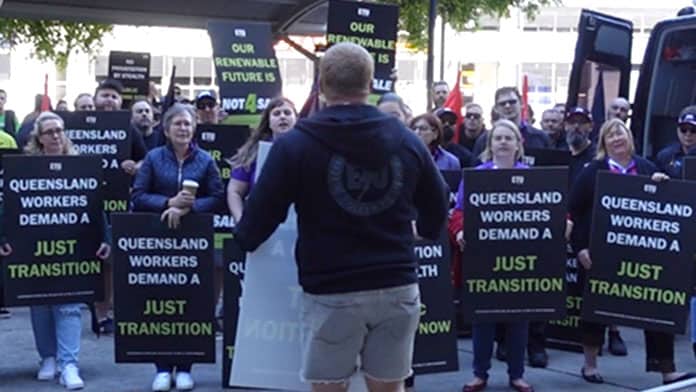The Queensland government has announced plans to boost public investment in renewable energy, as well as a job security guarantee for workers affected by coal power station closures.
Much more is needed to deliver the action necessary to avoid dangerous climate change. But the plan shows that it’s possible to deliver significant public investment and ownership of renewable energy, as well as alternative jobs for existing workers in fossil fuel industries.
The Electrical Trades Union (ETU) has campaigned for a publicly funded transition over the past five years and the demand for job guarantees for fossil fuel workers has been a feature of the major school climate strikes. The broader climate movement should take confidence from this announcement and take these demands up nationally.
The ETU has celebrated the plan as “the first of its kind in Australia”, adding that the Energy Workers Charter signed by the union “guarantees that no energy worker will be left out of work through the transition to renewable energy”.
Workers in existing power stations will get the chance to transfer to new jobs at publicly-owned energy companies and undertake additional training for work in the new energy system.
But the speed of the planned move to renewable energy is no dramatic shift. Queensland is currently more reliant on coal power than elsewhere, getting a lower share of its power needs from renewables than other states.
Climate and energy expert Dylan McConnell has pointed out that its assumption of reaching 70 per cent renewable energy by 2030 is exactly in line with the official Australian Energy Market Operator step change projections. Anthony Albanese’s climate plan based on these envisages 82 per cent renewable energy nationally by the same date.
That means Queensland needs to do more to go beyond the weak federal target of 43 per cent emissions reductions by 2030. Its new plan still involves building a new gas peaking plant, which it claims will be ready to convert to run on hydrogen, much like the myth the federal Labor government spins over the new Kurri Kurri plant in NSW. And expansion of coal and gas mining will undo much of the emissions reduction from power station closures.
But it underscores the importance of proactive union campaigning and public investment, as workers and communities face the closure of coal power stations across the country, often earlier than planned. This week AGL announced that Loy Yang A power station in Victoria will shut ten years earlier than planned, by 2035, and Bayswater in NSW may close by 2030.
Public investment
Just over half of the $34 billion in spending on new power generation will be public investment, with most of the rest to come from private investors.
The plans aims to maintain 54 per cent public ownership of the power industry in the state. The fact that Queensland never privatised its power stations, unlike other states, puts it in a far better position to achieve this.
Its state-owned energy companies mean it is able to offer new jobs to workers in the fossil fuel industry in the renewables sector. Importantly, it makes possible jobs with the same decent pay and conditions in the public sector as workers currently have in the coal industry.
This is an approach other states should follow. If Queensland state-owned companies can borrow and fund public investment in renewables, other states can too.
In Queensland $2.5 billion of the funding required will come from coal royalties, following a recent decision to increase tax on coal companies by $1.2 billion over four years. This is a drop in the ocean given the mega-profits gas and coal companies are currently making due to surging international prices. A federal windfall profits tax could fund billions more in public investment in renewables.
Taxing the rich could pay for the transition and jobs we need to avoid climate catastrophe and make sure workers aren’t left behind in the process.
By James Supple






